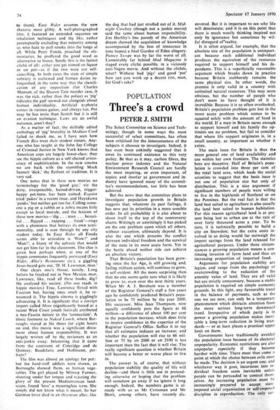AMERICA
Of pot and pigs
GEOFFREY WAGNER
New York—The moviegoer is used to clichés. In fact, he enjoys them. The result is that the new rhetoric of the hippie cinema is rapidly anaesthetising the alleged liberalism of its master concepts. And with MGM an- nouncing a loss last year of some $36 million, and Paramount not far behind, 'shoestring' cinema has obvious attractions for perspiring front offices. Coming Apart . . . Three . . . John and Mary . . . Bob and Carol . . . the variations are minor within the new mindlessness.
The new vocabulary of these movies in- sists that instead of the 'good' cowboy dis- charging social debts—Buck Jones flailing his way across the prairies in a white hat— anyone who smokes pot is automatically good, and the evasion of such debts emin- ently desirable. Parenthetically, one observes that in that admirable elegy Butch Cassidy and the Sundance Kid the white hat be- longed to the hired assassin ('Who can these guys be?' repeatedly asks 'Butch', Paul Newman. 'How could they do such a thing?'). In The Last Summer, freely adapted from an Evan Hunter fiction and lightly critical of such social irresponsibility, the young cop-outs smoke 'joints' left handy by their parents in their Fire Island pad.
Society cheats, so why shouldn't they? Life is a lie, so why not lie to it? (It took Jacques Hamm to point out that students who choose to cheat on this basis would yell in outrage if their professors did the same
to them). Easy Rider assumes the new rhetoric most glibly. A well-photographed
film, it featured an extended sequence on inhalation techniques and the like, rather peremptorily excluding that minority among us who hate to pull smoke into the lungs at all. While Peter Fonda preached the ele- mentaries, he proffered the good weed as alternative to booze. Surely this is the laziest cliché of all: either you get stoned on liquor or on pot—as if the two were not self- cancelling. In both cases the state of simple sobriety is eschewed and human duties re- linquished, in the same way that the classifi- cation of any opposition (for Charles Manson, of the Sharon Tate murder case, it was the rich, rather than the police) as 'pig' ridicules the guff spewed out alongside about human individuality. Artificial euphoria comes in various guises, and always has. Pot may be less toxic than Scotch but it is still an evasion technique. Laws are an awful nuisance, aren't they?
As a matter of fact, the skilfully edited anthology of 'pig' brutality in Medium Cool failed to shock me, as I have seen how French flies treat their student rioters. Any- one who has taught at the John Jay College of Criminal Justice in New York knows that American cops are largely lower-class; they see the hippie culture as a self-elected aristo- cracy of sophistication. In the new cinema we are back with the stumbling Mack Sennett 'dick,' the flatfoot of tradition. It is very sad.
One notes that in these new 'movies no terminology for the 'good guy,' viz the dirty, irresponsible, hatred-driven, trigger- happy pot-hero, has been coined. Esquire tried 'pukes' in a recent issue, and Hayakawa `punks,' but neither got too far. Calling some- one a pig or a rabbit or a zebra means little except to local morale, and the lexicon of these new movies—`dig . .. man . . . beauti- ful .. . flipped ... rapping . freak'—rings with a phoniness that betrays its own senti- mentality, and is seen through by any city student today. In Easy Rider all Fonda seems able to articulate is 'Wow!' and `Man!', a litany of the aphasic that would not get him far in the classroom. The clue is given best perhaps when, at one of the hippie communes frequently portrayed (Easy Rider, Alice's Restaurant etc.), a giggling Jesus-beard gets out, 'D. H. Lawrence, man.'
One clears one's throat, noisily. Long before he freaked out in New Mexico, man, Lawrence, like, read all these books, dig? He analysed his society. (No one reads in hippie movies.) True, Lawrence flirted with
Fascism but, having once smelt it, he re- nounced it. The hippie cinema is gigglingly advocating it. It is significant that a foreign import called More (significantly booed at a
recent West Coast youth festival) attributed a neo-Fascist nature to the 'connection'. A
filmic footnote to Naked Lunch, where Bur-
roughs stared at his shoes for eight hours on end, this movie was a significant docu- ment about human responsibility. It was largely written off by the reviewers as an anti-junkie essay. Interesting that it came from the continent of Coleridge and de Quincey, Baudelaire and Hoffmann, per- haps?
The film was almost an apology for pot: but the hard-stuff addicts were shown, as Burroughs showed them, as human vege- tables. The girl played by Mims,* Farmer, shooting under her tongue and rejecting the
glory of the present Mediterranean land- scape, found 'love' a meaningless term. She simply did not know what it meant. So her German lover died in an ibizencan alley, like the dog that had just strolled out of it. Mid- night Cowboy (though not a junkie movie) said the same about human responsibility. Jim Herlihy's fine parody of the American dream showed the acquisition of knowledge accompanied by the loss of innocence in (one hopes) a final Garden of Eden allegory. Putney Swope was by far the worst of all. Lamentably far behind Mad Magazine it staged every cliche possible, in a viciously anti-Negro movie. And without the clichés, what? Without bad 'pigs' and good 'pot' how can you work up a decent riot, man, for God's sake?



































 Previous page
Previous page